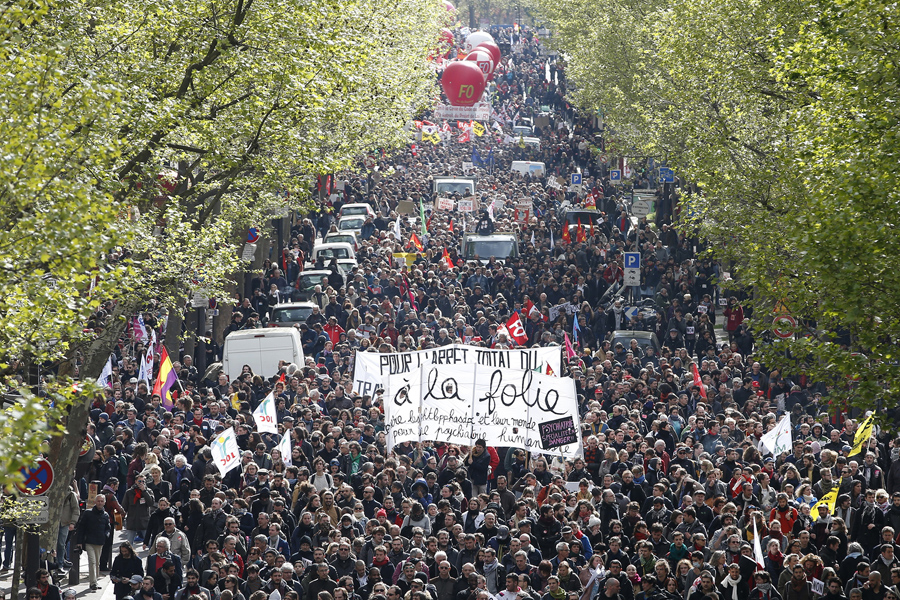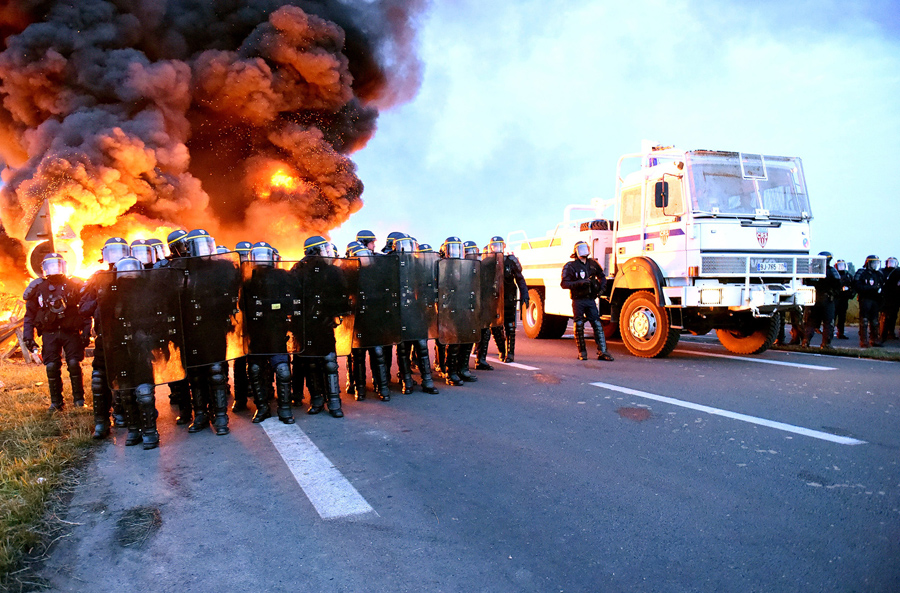Since March, a series of protests, strikes, and marches have slowed down or stopped various parts of France, as demonstrators and labor unions voice their opposition to a set of proposed labor law reforms that will relax existing regulations. France’s Socialist government has pushed through proposals that will lengthen the work week to 48 hours from 35, and make it easier for employers to hire and fire workers, despite strong opposition in Parliament and from the public. As the French Senate began debating the proposals this week, more protests and strikes are planned—even while France’s infrastructure is being strained as it hosts the Euro 2016 Soccer Championship.
 French labor union workers and students attend a demonstration against the French labor law proposal in Paris, France, as part of a nationwide labor reform protests and strikes, on April 28, 2016.Charles Platiau / Reuters
French labor union workers and students attend a demonstration against the French labor law proposal in Paris, France, as part of a nationwide labor reform protests and strikes, on April 28, 2016.Charles Platiau / Reuters Riot police prepare to intervene to disperse refinery workers staging a blockade of the Douchy-Les-Mines oil depot to protest against the government's proposed labor reforms, on May 25, 2016. Refinery workers stepped up strikes that threatened to paralyze France ahead of the Euro 2016 tournament.Francois Lo Presti / AFP / Getty
Riot police prepare to intervene to disperse refinery workers staging a blockade of the Douchy-Les-Mines oil depot to protest against the government's proposed labor reforms, on May 25, 2016. Refinery workers stepped up strikes that threatened to paralyze France ahead of the Euro 2016 tournament.Francois Lo Presti / AFP / Getty Commuters wait for a bus to Orly Airport during a railway strike in Paris, on Thursday, June 2, 2016. Workers at the SNCF national rail authority, whose train service are crucial to football's Euro 2016 spectators, were on an open-ended strike to protest their working conditions and a controversial government labor reform.Francois Mori / AP
Commuters wait for a bus to Orly Airport during a railway strike in Paris, on Thursday, June 2, 2016. Workers at the SNCF national rail authority, whose train service are crucial to football's Euro 2016 spectators, were on an open-ended strike to protest their working conditions and a controversial government labor reform.Francois Mori / AP A waiter stands near a pile of trash bags in front of the Cafe de Flore in Paris during a garbage-collector and sewer-worker strike in Paris to protest the labor reforms law proposal, on June 8, 2016.Charles Platiau / Reuters
A waiter stands near a pile of trash bags in front of the Cafe de Flore in Paris during a garbage-collector and sewer-worker strike in Paris to protest the labor reforms law proposal, on June 8, 2016.Charles Platiau / Reuters A view of people listening to speeches as they take part in the Nuit Debout , or Up All Night, movement at Place de la Republique on April 10, 2016, in Paris, France. Hundreds of people occupy the Place de la Republique every night since March 31, to protest against the state of emergency, poor housing, and the labor reform laws.Aurelien Meunier / Getty
A view of people listening to speeches as they take part in the Nuit Debout , or Up All Night, movement at Place de la Republique on April 10, 2016, in Paris, France. Hundreds of people occupy the Place de la Republique every night since March 31, to protest against the state of emergency, poor housing, and the labor reform laws.Aurelien Meunier / Getty This combination of photos taken on April 6, 2016, shows (from left, top row) Cherifa, a French student at Paris’s Louis-le-Grand high school, Lucas, who has decided to settle on Place de la Republique as long as the movement lasts, Abdallah, presenting himself as a 65-years-old anarchist. From left, middle row: Victor, a musician who has decided to come and play with his band, Regis, who is just curious about the movement, Michel, an artist who wishes to be a candidate in the 2017 French presidential elections. From left, bottom row: Therese, holding the Palestinian flag, Maxime, a mechanic from Normandy, and Claude, who has decided to come alone and listen to the speeches. All have decided to take part in the Nuit Debout, or Up All Night, movement, posing on Place de la Republique in downtown Paris. Anger over labor reforms spawned the protest movement that took over French city squares, with young people gathering until dawn demanding social change.Elliott Verdier / AFP / Getty
This combination of photos taken on April 6, 2016, shows (from left, top row) Cherifa, a French student at Paris’s Louis-le-Grand high school, Lucas, who has decided to settle on Place de la Republique as long as the movement lasts, Abdallah, presenting himself as a 65-years-old anarchist. From left, middle row: Victor, a musician who has decided to come and play with his band, Regis, who is just curious about the movement, Michel, an artist who wishes to be a candidate in the 2017 French presidential elections. From left, bottom row: Therese, holding the Palestinian flag, Maxime, a mechanic from Normandy, and Claude, who has decided to come alone and listen to the speeches. All have decided to take part in the Nuit Debout, or Up All Night, movement, posing on Place de la Republique in downtown Paris. Anger over labor reforms spawned the protest movement that took over French city squares, with young people gathering until dawn demanding social change.Elliott Verdier / AFP / Getty A photo taken on June 15, 2016 shows graffiti, spray painted during a demonstration against labor reforms on June 14, reading “in ashes all becomes possible”on a wall near the Musee Rodin on Boulevard des Invalides in Paris.Jacques Demarthon / AFP / Getty
A photo taken on June 15, 2016 shows graffiti, spray painted during a demonstration against labor reforms on June 14, reading “in ashes all becomes possible”on a wall near the Musee Rodin on Boulevard des Invalides in Paris.Jacques Demarthon / AFP / Getty Students shout slogans during a demonstration in Marseille, southern France, on April 28, 2016, during a nationwide day of protest. Student organizations and employee unions have joined to call for protests across France to reject a government reform relaxing the 35-hour working week and other labor rules. #Claude Paris / AP
Students shout slogans during a demonstration in Marseille, southern France, on April 28, 2016, during a nationwide day of protest. Student organizations and employee unions have joined to call for protests across France to reject a government reform relaxing the 35-hour working week and other labor rules. #Claude Paris / AP French riot police face masked protesters attempting to break pieces of stone off of a building during a demonstration against proposed labor reforms in Paris on June 14, 2016. Several hundred masked protesters hurled objects at police on June 14 during a demonstration in Paris, authorities said.Dominique Faget / AFP / Getty
French riot police face masked protesters attempting to break pieces of stone off of a building during a demonstration against proposed labor reforms in Paris on June 14, 2016. Several hundred masked protesters hurled objects at police on June 14 during a demonstration in Paris, authorities said.Dominique Faget / AFP / Getty A police car burns during a demonstration against police brutality on May 18, 2016, in Paris. Around 200 people demonstrated against police brutality, despite the demonstration being forbidden by the police department.Aurelien Meunier / Getty
A police car burns during a demonstration against police brutality on May 18, 2016, in Paris. Around 200 people demonstrated against police brutality, despite the demonstration being forbidden by the police department.Aurelien Meunier / Getty A vehicle burns as French riot police clear the Place de la Republique in Paris during a protest by the Nuit Debout, or Up All Night, movement on April 29, 2016.Alain Jocard / AFP / Getty
A vehicle burns as French riot police clear the Place de la Republique in Paris during a protest by the Nuit Debout, or Up All Night, movement on April 29, 2016.Alain Jocard / AFP / Getty Workers hold flags and demonstrate during a day of strikes and protests, in Marseille, southern France, on June 14, 2016. Workers strike across sectors of the French economy and march through French cities in what unions hope is a huge outpouring of discontent at changes to labor protections and a big challenge to the government.Claude Paris / AP
Workers hold flags and demonstrate during a day of strikes and protests, in Marseille, southern France, on June 14, 2016. Workers strike across sectors of the French economy and march through French cities in what unions hope is a huge outpouring of discontent at changes to labor protections and a big challenge to the government.Claude Paris / AP A police surveillance drone flies over a demonstration against the French labor law proposal in Paris, as part of nationwide labor reform protests and strikes on April 28, 2016.Charles Platiau / Reuters
A police surveillance drone flies over a demonstration against the French labor law proposal in Paris, as part of nationwide labor reform protests and strikes on April 28, 2016.Charles Platiau / Reuters A French policeman in riot gear holds a flashball gun as French high school and university students take part in a demonstration against the labor reform bill proposal in Nantes, France, on March 24, 2016.Stephane Mahe / Reuters
A French policeman in riot gear holds a flashball gun as French high school and university students take part in a demonstration against the labor reform bill proposal in Nantes, France, on March 24, 2016.Stephane Mahe / Reuters A protestor uses a tennis racket to return a tear gas canister during a demonstration to protest the government's proposed labor law reforms in Nantes, France, on June 2, 2016.Stephane Mahe / Reuters
A protestor uses a tennis racket to return a tear gas canister during a demonstration to protest the government's proposed labor law reforms in Nantes, France, on June 2, 2016.Stephane Mahe / Reuters A cloud of tear gas swirls around the statue of the Place de la Nation during clashes between youths and police at a demonstration against the French labor law proposal in Paris on April 28, 2016.Philippe Wojazer / Reuters
A cloud of tear gas swirls around the statue of the Place de la Nation during clashes between youths and police at a demonstration against the French labor law proposal in Paris on April 28, 2016.Philippe Wojazer / Reuters















댓글 없음:
댓글 쓰기